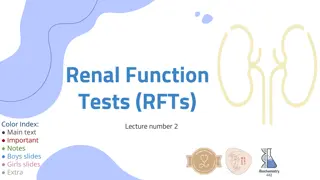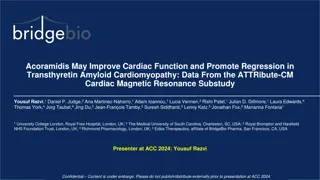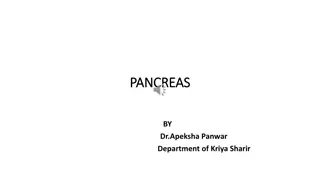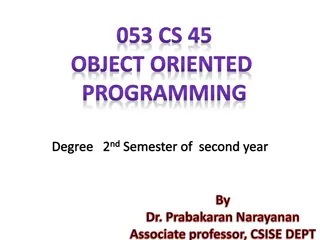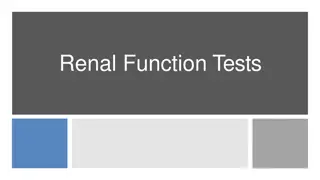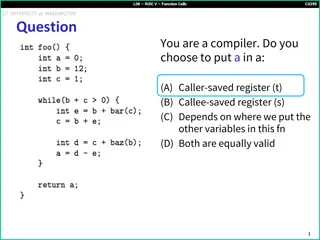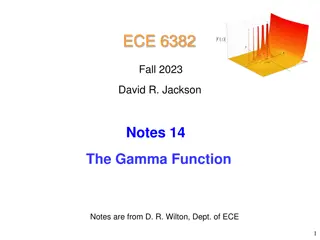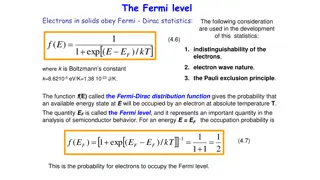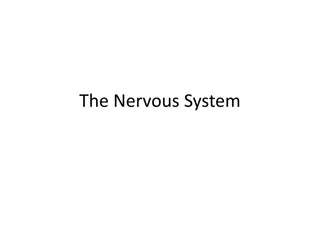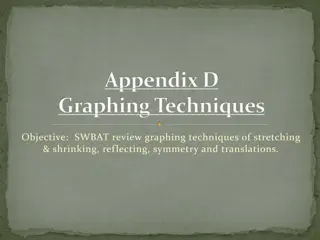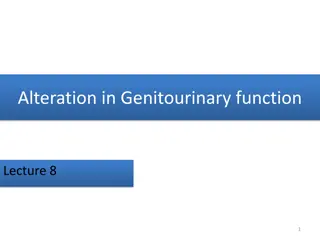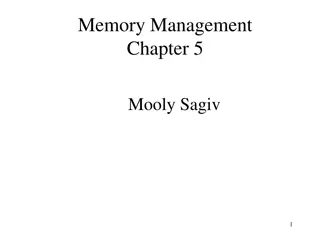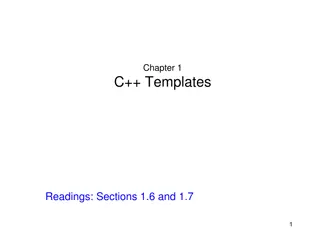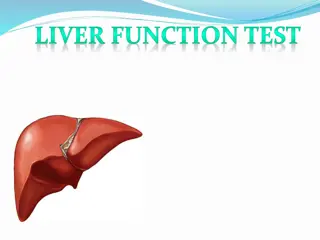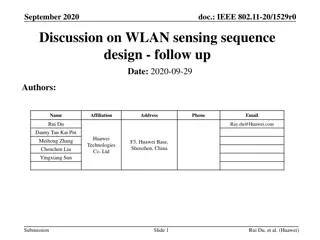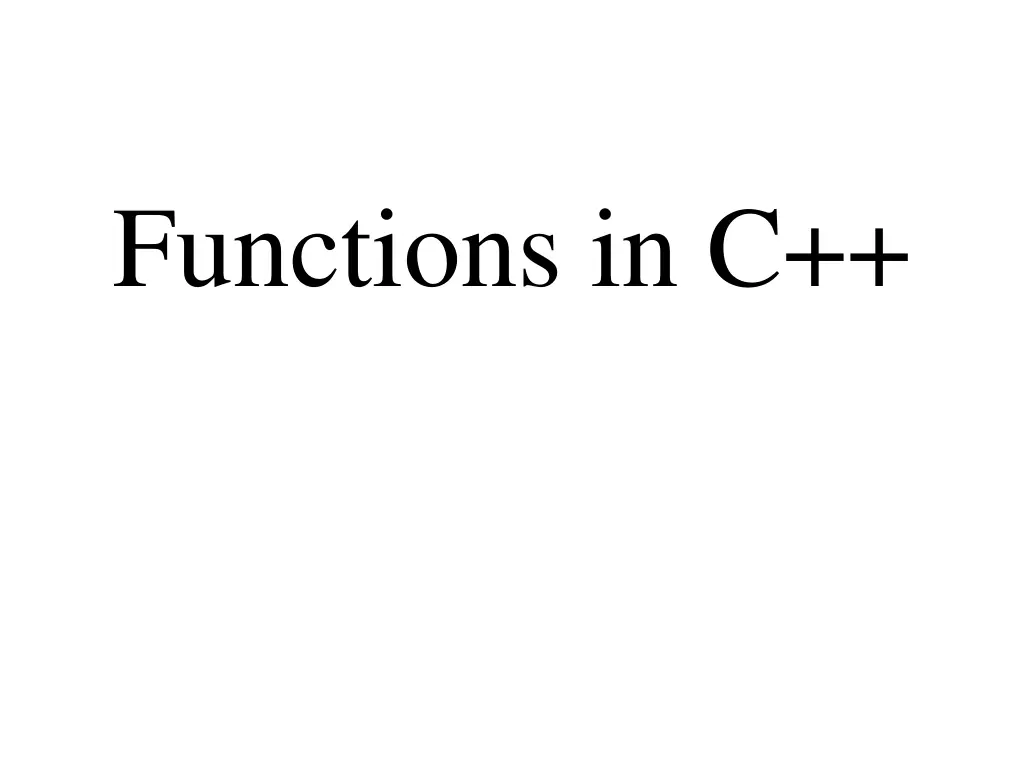
Understanding Functions in C++ Programming
"Learn about the importance of functions in C++ programming, including types of functions, built-in and user-defined functions, parts of functions, function prototype declaration, function definition, and function calls. Enhance your C++ programming skills by mastering the concept of functions."
Download Presentation

Please find below an Image/Link to download the presentation.
The content on the website is provided AS IS for your information and personal use only. It may not be sold, licensed, or shared on other websites without obtaining consent from the author. If you encounter any issues during the download, it is possible that the publisher has removed the file from their server.
You are allowed to download the files provided on this website for personal or commercial use, subject to the condition that they are used lawfully. All files are the property of their respective owners.
The content on the website is provided AS IS for your information and personal use only. It may not be sold, licensed, or shared on other websites without obtaining consent from the author.
E N D
Presentation Transcript
What is function? A function contains group of statements that perform a specific task. Every Program in C++ contain at least one function that is main(). It divide a program into number of small modules. Save the time. Reduce the size of the program. Reduce the chances of error.
Types of function Built in types or predefined function User defined function
Built in type or predefined These are also called library functions. Examples: getch() gets() puts() They perform only limited task. Programmer has no control over these functions.
User defined functions These are user created functions. User has full control over it. User can designed any number of functions to perform a task which he want. These functions are created as per the requirements of the program.
Parts of the functions An user defined function has the following components: Prototype declaration Function definition Function call
Function prototype declaration A function prototype is a declaration of a function that tells the program about the type of value returned by the function, name of function, number and type arguments. Syntax: Return_type function_name (parameter list/argument); Exp: int add(int,int); void add(void); int add(float,int); of Contain 4 parts: Return type Function name Argument list Terminatingsemicolon
Function definition Complete task is defined Syntax is: return_type fun_name(argument list/parameter list) { body of the function } Function header Example: int add(int x,int y) { return (x+y); } Contain the complete description about the task
Function call Each function is called by its calling function. Only name of the function along with the actual arguments are used. Synatx: fun_name(actual arguments); Example: add(x,y); or add(3,6);
Example void add(int,int); main() { statement1; statement2; add(4,5); statement; } void add(int x,int y) { function body; } Funtion prototype declaration Function call Calling function Called function Function definition
Relation between calling function and called function Functions are communicated through sending values to each other. Calling function can send nothing or values as an actual parameter to the called function which receives these values in formal parameter . Called function can communicate with calling function through returning either nothing or the result of calculation of the function.
Categories of functions i) Function with no return value and no argument. void add(void); ii) Function with arguments passed and no return value. void add(int,int); iii) Function with no arguments but returns a value. int add(void); iv) Function with arguments and returns a value. int add(int,int);
Function with no return value and no argument In this situation calling function and called function do not communicate through any value. Example: No communication between these two functions main() { statement1; statement2; add(void); statement; } void add(void) { code of adding two numbers. }
Function with arguments passed and no return value. In this situation calling function provide the value to the called function but called function does not return any value to its calling function. One way communication is accomplished. main() { statement1; statement2; statement; } void add(int x,int y) { code of adding two numbers. } One way communication between these two functions add(4,7);
Function with no arguments but returns a value In this situation calling function does not pass any value to its called function but called function return the result of the task to its calling function. Again one way communication. main() { statement1; statement2; int c=add(void); cout>>c; } int add(void) { int a,b; cin>>a>>b; return (a+b); } One way communication between these two functions
Function with arguments and returns a value In this situation both function can send and receive the value. Two way communication is accomplished. main() { statement1; statement2; int c=add(4,8); cout>>c; } int add(int a,int b) { cin>>a>>b; return (a+b); } Two way communication between these two functions
Formal parameter and actual parameter The parameters passed in function definition is called formal parameter. And the parameter passed in the function call is called actual parameter. main() { statements; int c=add(4,8); cout>>c; } Actual parameters int add(int a,int b) { cin>>a>>b; return (a+b); } Formal parameters
Arguments passed in functions Two possibilities Pass by value Pass by Reference
Pass by value Here the called function creates a new set of variables and copies the values of the arguments into them. The called function does not have the access to the actual variables in the calling program and can only work on the copies of the values. In this case if any change done on the formal parameters then it does not affect on the actual parameters of the calling program.
Example void incCount(int count) { count =count+1; cout<<count; } main() { int count=0; incCount(count); cout<<count; }
Pass by reference/Pass by Address It means the reference of an argument in the calling function is passed to the corresponding formal parameter of the called function so that a copy of the address of the actual parameter is made in memory,. The caller and the callee use the same variable for the parameter. If the called function modifies the parameter variable, the effect is visible to the actual parameter of the calling program. Overview: Passes an argument by reference. Callee gives a direct reference to the programming element in the calling code. The memory address of the stored data is passed. Changes to the value have an effect on the original data.
Example void fun1(int &x) { x = 50; cout << "Value of x from fun1: " << x << endl; } main() { int x = 10; fun1(x); cout << "Value of x from main function: " << x; } Here both calling function and called function use the same memory space
Inline function Normally, a function call transfers the control from the calling program to the called function. This process of jumping to the function, saving registers, passing a value to the argument, and returning the value to the calling function takes extra time and memory. The work also done by the compilers when the size of the function is small. C++ provides the solution of this problem.
Definition of inline function An inline function is a function that is expanded inline when it is invoked, thus saving time. The compiler replaces the function call with the corresponding function code, which reduces the overhead of function calls. To inline a function, place the keyword inline before the function name and define the function before any calls are made to the function. The compiler can ignore the inline qualifier in case defined function is more than a line.
The inline function is defined as follows:
Inline function are not beneficial in following situation: If a function contain more than 2 lines of code If a function contain loop , switch or go to statements. If function contains static variables. If function recursive.
Example #include<iostream> using namespace std; inline int Max(int x, int y) { return (x > y)? x : y; } int main() { cout << "Max (20,10): " << Max(20,10) << endl; cout << "Max (0,200): " << Max(0,200) << endl; cout << "Max (100,1010): " << Max(100,1010) << endl; return 0; }
Default arguments A default argument is a default value provided for a function parameter. If the user does not supply an explicit argument for a parameter with a default argument, the default value will be used. If the user does supply an argument for the parameter, the user-supplied argument is used. Default values are specified when function is declared.
Important rule A default argument is checked for type at the time of declaration and evaluated at the time of call. Only the trailing arguments can have default values and therefore we must add defaults from right to left. Default value to a particular argument can not be provided at the middle of the argument list.
For example int add(int x=10,int y=2,int z=9) int add(int x,int y=2,int z) int add(int x=10,int y=2,int z) int add(int x,int y,int z=9) int add(int x=2,int y,int z=9) correct incorrect incorrect correct incorrect
Int mul(int x,int y=20,int z=30); main() { int rs; rs = mul(5); cout<<"The mul is : "<<rs<<endl; rs = mul(4,8); cout<<" The mul is : "<<rs<<endl; rs = mul(7,3,4); cout<<" The mul is : "<<rs; } int mul(int x, int y, int z) { return x * y * z; } X contain 5 and y contain 20, z contain 30 X contain 4, y contain 8 and z contain 30 X contain 7, y contain 3 and z contain 4 OUT PUT
Thank You Any Question??



